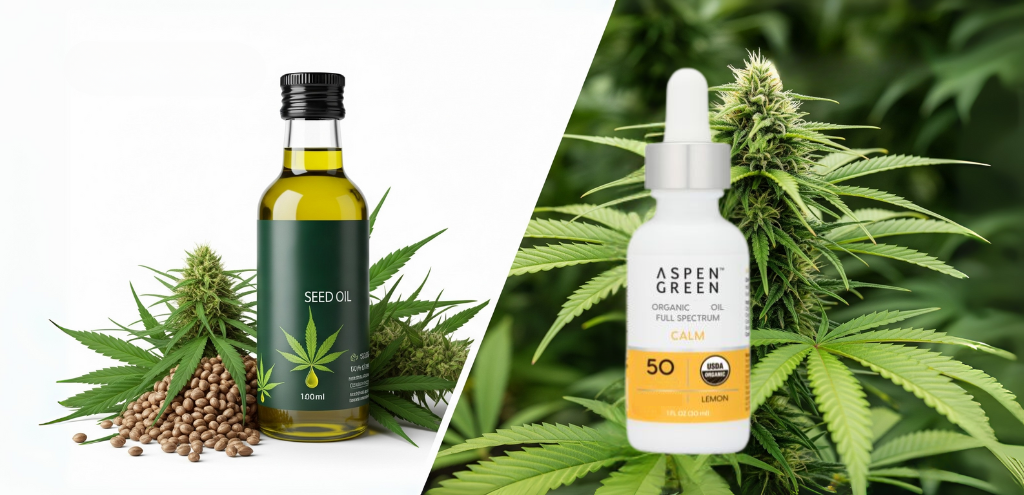One common question that often arises in the wellness community is: Is hemp oil the same as CBD oil? Although these terms are sometimes used interchangeably, there are important differences that set them apart. Understanding these differences helps consumers make informed choices.
Aspen Green is proud to be a trusted source of botanically crafted, hemp-derived Delta-9 THC and CBD products that support natural wellness.
This blog will highlight the distinctions between hemp oil and CBD oil, helping you choose what suits your lifestyle best.
What is Hemp Oil?
Hemp oil, also known as hemp seed oil, is extracted by cold-pressing the seeds of the hemp plant. It is naturally rich in omega-3 and omega-6 fatty acids, which are essential for maintaining healthy skin, heart health, and nutrition. Additionally, hemp seed oil contains important vitamins such as vitamin E and B vitamins.
Importantly, hemp oil contains no CBD or other cannabinoids because cannabinoids are not present in hemp seeds. The oil has a pleasantly nutty flavor and is commonly used as a cooking oil, in skincare products, and as a nutritional supplement.
Hemp seed oil is a popular choice for those looking to support their wellness with natural, nutrient-dense ingredients and is widely embraced for its versatility in daily use.
What is CBD Oil?
CBD oil is derived from the flowers, leaves, and stalks of the hemp plant, where cannabidiol (CBD) and other beneficial plant compounds are concentrated. Unlike hemp oil, CBD oil contains cannabinoids, which may promote a sense of balance, calmness, and overall wellness.
Aspen Green offers premium, botanically crafted CBD products, including Bliss Tropical CBD Oil, designed for daytime support and a feeling of natural activation, and Rest Berry CBD Oil, tailored for nighttime ease and relaxation rituals. Both products are third-party lab tested and made from organically grown hemp.
CBD oil is often used as part of a wellness routine to support the body’s natural rhythm and encourage calm and balance without any drug-like language or guaranteed effects.
Hemp Oil vs CBD Oil: Key Differences
Feature | Hemp Oil | CBD Oil |
| Source | Extracted from hemp seeds | Extracted from hemp flowers/leaves |
Cannabinoid Content | None | Contains CBD and other plant compounds |
Common Uses | Nutrition, cooking, skincare | Supports balance and relaxation |
Flavor and Texture | Nutty flavor, light oil | Often earthy, varies by formulation |
Price Range | Generally more affordable | Typically higher due to extraction |
These differences highlight two distinct oils serving different purposes, one for nourishment and one for wellness support.
Hemp Oil vs CBD Oil for Dogs
Hemp oil is often used in pet nutrition for its omega fatty acids that support healthy skin and a shiny coat. CBD oil is sometimes considered to help pets with calmness and maintaining balance in mobility.
Aspen Green’s carefully crafted oils are formulated for people and contain botanically crafted ingredients meeting high-quality standards. While some owners explore hemp and CBD oils for pets, it’s essential to choose products specifically designed for animals and consult veterinarians.
Why People Confuse Hemp Oil and CBD Oil
The confusion between hemp oil and CBD oil often stems from mislabeling and how products are marketed. Some brands loosely use the term “hemp oil” to refer to both hemp seed oil and CBD oil, which adds to the misunderstanding.
Aspen Green ensures clear product labeling, highlighting whether a product contains hemp-derived Delta-9 THC or additional cannabinoids, including cannabidiol.. Furthermore, every product undergoes rigorous third-party lab testing for transparency, safety, and quality assurance.
Benefits of Each
Benefits of Hemp Oil:
- Rich in essential fatty acids that support heart and skin health
- Provides nutritional support and hydration, useful in skincare and cooking
- Contains no cannabinoids, so no psychoactive effects
Benefits of CBD Oil:
- Supports a sense of calm and daily balance
- Promotes natural relaxation as part of a holistic wellness routine
- Contains cannabinoids that interact with the body’s natural systems
Aspen Green products focus on clean ingredients and pure formulations to deliver these benefits.
How Long Does CBD Oil Last?
The duration of CBD oil’s effects in the body varies depending on factors like serving size, individual metabolism, and body rhythm. While the consumer experience may differ, the shelf life of CBD oil, when stored properly in a cool, dark place and sealed tightly, is typically between 1 and 2 years.
Aspen Green ensures all products are made with fresh, lab-tested ingredients, and customers should always check product labels for batch freshness and storage recommendations.
Which One Should You Choose?
If the priority is nutrition or skincare, hemp oil is an excellent choice rich in nourishing fatty acids. For those seeking to support balance, relaxation, and overall daily wellness, CBD oil offers a botanically crafted option.
Aspen Green invites you to try the Bliss CBD Oil for natural daytime support or the Rest Berry CBD Oil to support your nighttime relaxation rituals.
To wrap it up
Hemp oil and CBD oil are not the same. Hemp oil is a nutrient-packed oil from hemp seeds, perfect for nutrition and skincare, while CBD oil comes from hemp flowers and leaves, supporting a balanced, calm lifestyle. Aspen Green remains a trusted source for premium, clean, and lab-tested CBD products.
Explore Aspen Green’s Bliss and Rest CBD oils to bring natural balance and support to your daily wellness routine.
F & Q’s
No, hemp oil and CBD oil come from different parts of the hemp plant and serve different purposes.
No, hemp seed oil does not contain CBD or cannabinoids.
Hemp oil supports nutrition, such as healthy skin and coat; CBD oil may help with calmness and mobility.
Look for terms like “hemp-derived Delta-9 THC” or “CBD oil” on labels, and verify third-party lab test results.
Aspen Green offers third-party lab-tested, organically grown hemp products that are physician-formulated, botanically crafted with clean ingredients, ensuring quality and transparency.

